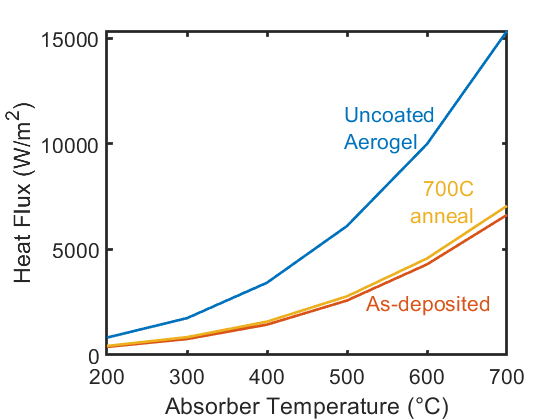(612f) Robust and Spectrally Selective Aerogels for Next-Generation Concentrated Solar Thermal Conversion
AIChE Annual Meeting
2020
2020 Virtual AIChE Annual Meeting
Sustainable Engineering Forum
Symposium on Solar Power and Chemical Systems in Honor of Prof. Aldo Steinfeld VII
Thursday, November 19, 2020 - 9:30am to 9:45am
Although silica aerogels have led to improvements in solar collection efficiency at low to intermediate temperatures, they are plagued by low efficiency and performance degradation at temperatures necessary for next-generation concentrated solar thermal (CST) plants (>700 °C). The low efficiency of silica aerogels at high temperatures is a result of large thermal re-radiative losses through their infrared transparency window between 3 – 5 microns. Furthermore, previous work shows that exposure to such temperatures decreases the spectral selectivity (i.e. increased infrared transparency) and increases thermal conductivity of silica aerogels resulting in even lower receiver efficiency. Here, we investigate multicomponent aerogels which exhibit increased spectral selectivity and mitigate performance degradation at 700 °C. Specifically, we stabilize the aerogels at elevated temperatures by applying an ultrathin coating of solar-transparent refractory oxides via atomic layer deposition (ALD). Interestingly, our multicomponent aerogels absorb strongly within the aerogel’s infrared transparency window, leading to >50% reduction in thermal losses at 700 °C without sacrificing high solar transmission. We characterize the effects of the ALD coating on the optical and thermal properties of the aerogels using UV-Vis-NIR, ellipsometry, FTIR, and hot-disk techniques. Additionally, we report on our methods to develop a uniform and conformal ALD coating by modeling the diffusion and reactant requirements of ALD on aerogels. Lastly, we compare the experimentally determined receiver efficiencies with our simulations of coupled radiative and conductive heat transfer. Our results reveal that ultrathin, conformal ALD coatings not only slow down the rate of efficiency degradation, but significantly improve the performance of aerogels in high temperature CST solar receivers.


